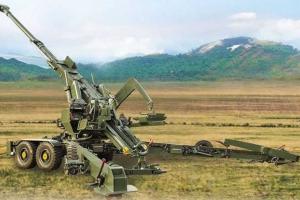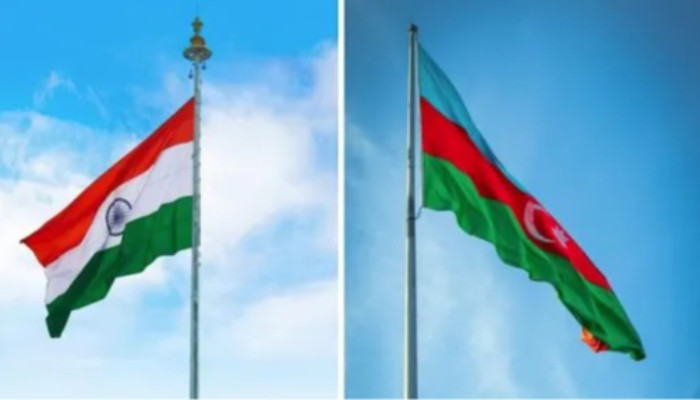Silent but resilient: India-Armenia defence cooperation is a game changer in South Caucasus
Opinion by Vimal Harsh
• 2h • 4 min read
Representational image. REUTERS© Copyright (C)
https://firstpost.com. All Rights Reserved.
Armenia, a country in the Caucasus region of West Asia, has chosen to induct the Tajan 155mm towed artillery gun system that has been jointly developed by India and France. This move strengthens India's position as a major defence partner for Armenia’s military modernisation. India has been supplying advanced guns, rockets, radars, and missile systems to the landlocked nation in the last few years.
In November 2023, Armenia received the first supplies of launchers and associated equipment of multi-barrel rocket launchers, Pinaka, valued at $250 million. Additionally, Armenia had ordered 15 Akash missile systems in 2022, worth $720 million, a consignment of which was delivered last November.
Armenia has emerged as India's top defence export destination, after the US and France. The Trajan artillery system, developed by Bharat Forge and Nexter (a French weapons manufacturer), offers superior accuracy, mobility, and firepower, making it an ideal choice for the terrains of a country facing threats from its neighbourhood.
The Second Nagorno-Karabakh War in 2020 and the subsequent Azerbaijani offensive of 2023 have been an eye-opener for Armenia. In the former, the 44-day-long war resulted in Azerbaijan gaining control over 72 per cent of the territory of the breakaway state of Artsakh and a defeat of Armenia; in the latter, Azerbaijan gained control over the whole of Nagorno-Karabakh. These circumstances underscored Armenia's need for modernising its defence sector and choosing the alternatives.
Armenia, a Christian country, found itself compromised on having been overly dependent on Russia for its defence needs. While Muslim-majority Azerbaijan received support from Turkey, a middle power anxious to ‘regain’ leadership of the Islamic world.
Consequently, Armenia took a West-ward turn, forging close relations with the US and EU as Russia's closeness grew with Azerbaijan and Turkey. Remarkably, Iran supports Armenia, a Christian country, supported by the US! (Iran supported Armenia diplomatically, particularly in the context of the Nagorno-Karabakh conflict). Geopolitics in the 21st century for you!
And India, with its growing defence production sector and strategic interest in the Eurasian region, became Armenia's natural choice. Reportedly, India's defence production has gone up 2.6 times since Financial Year 2015. New Delhi has set a goal of increasing defence exports to ₹50,000 crore ($6 billion) by 2028-29, which seems well achievable.
Both India and Armenia have become crucial partners. New Delhi has been a trusted supplier of small arms, ammunition, and other light weaponry and has fit Yerevan’s equations for arms diversification. Armenia’s military supplies have been heavily dependent on Russia, and the changing geopolitical realities and experiences in the last couple of years have underlined the challenges of it, particularly in the context of Russia’s engagements in Ukraine and changing geopolitical equations in the South Caucasus and West Asia.
For India this purchase signifies expanding defense export markets and growing influence in the South Caucasus and Central Asia—an expanded neighborhood of India with historical ties, but now mostly covered up under the power equations of Russia, China, and Turkey.
The ties between India and Armenia are crucial to balancing Turkish influence in the region, which is mutually beneficial to both nations. Turkey’s close ties with Azerbaijan have been a constant concern for Armenia. Meanwhile, Turkey under the presidency of Recep Tayyip Erdoğan has pan-Islamic ambitions, which include warm relations with Pakistan and advocacy of the Kashmir issue overlooking growing Islamic fundamentalism in the region and Pakistan’s use of terror as an instrument to further its interests, particularly against India, and India's integral part—Kashmir.
Turkey's closeness with post-Sheikh Hasina Bangladesh has also been growing, and the nexus between Ankara and Islamabad now also includes Dhaka. Recently, in the second week of January, a Turkish delegation led by the country’s trade minister, Omer Bolat, met Bangladesh’s chief advisor, Muhammad Yunus, and discussed various issues of importance for both countries, such as defence, trade, and technology sharing.
Beyond all of these, Russia’s ongoing defence ties with Armenia are unlikely to be disrupted, as Armenia's strategic location remains vital to Russian interests in the region. Armenia is also a key member of the Russia-led Collective Security Treaty Organisation (CSTO), and Moscow continues to influence Armenia’s security policies. Having robust defence ties with India fits this equation as well, as India and Russia have been historical partners.
But there is still a lot left to be done; the partnership must not be limited to defence supply and purchase; it should expand to areas such as intelligence sharing, cyber defence, and joint military training so that a broader strategic alignment against common challenges, ranging from regional security threats to the evolving global balance of power, can be forged.
The Indo-Armenian cooperation will not just be a military partnership in the Caucasus region but will have geopolitical implications beyond, becoming a cornerstone of regional stability in an increasingly unpredictable world. As Sun Tzu says in
The Art of War: "In the midst of chaos, there is also opportunity".
Views expressed in the above piece are personal and solely those of the author. They do not necessarily reflect Firstpost’s views.




















 english.loktej.com
english.loktej.com












































